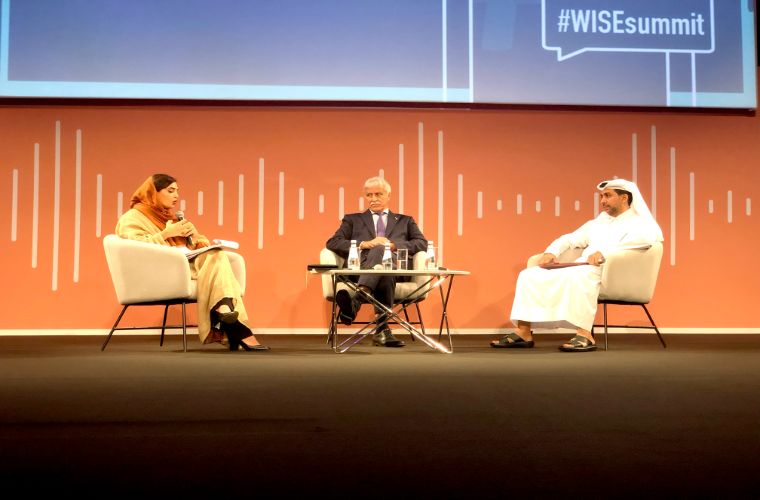Doha, Qatar - December 9, 2021 - Hamad Bin Khalifa University (HBKU), a member of Qatar Foundation, is taking part in the World Innovation Summit for Education (WISE) 2021, one of the largest and most influential gatherings shaping the future of education.
HBKU faculty have joined thousands of education leaders, experts, and innovators discussing solutions to global educational challenges. Underpinning HBKU’s contributions are new research findings on digital addiction, integrating social media in education, and thought leadership on the role of education in fostering equity, inclusion, and sustainability. Maker Majlis, a platform under the College of Islamic Studies (CIS), is participating as a WISE Knowledge Partner, showcasing efforts to create new learning ecosystems to engage youth in achieving the Sustainable Development Goals.
Aligning with the theme Generation Unmute: Reclaiming our Future through Education, HBKU presented a global perspective on education challenges in the Qatari context at several sessions on December 8.
Dr. Amal Al-Malki, Founding Dean of the College of Humanities and Social Sciences (CHSS), discussed “The Role of Higher Education in Fostering Equity and Learner Wellbeing”. Her talk focused on how health and education are connected, giving higher education a crucial role in promoting equity and wellbeing among young learners in the region. Also participating in this discussion were Dr. Hassan Al-Derham, President of Qatar University, and His Excellency Dr. Marwan Awartani, Minister, Ministry of Education, Palestine.
Dr. Susan Karamanian, Dean of the College of Law, participated in a workshop titled “Generation #UniteToProtect”, which discussed Education Above All Foundation’s Protect Education in Insecurity and Conflict program. The program has developed a unique capacity-building module for young people in conflict-affected situations to obtain knowledge and skills that are essential to be an active member of the world, such as human rights, traditional and creative advocacy, conflict resolution, and sustainable peacebuilding.
Dr. Raian Ali, Professor of Information and Computing Technology at the College of Science and Engineering (CSE), presented his project “Technology Overuse Amongst Adolescents in Qatar”. It is one of the first studies worldwide that compares the ‘addictive’ technology use of adolescents and their parents, contrasting their perspectives, and analyzing their argumentation process. A Meet the Author session with Dr. Ali offered an in-depth look into his findings.
Faculty and researchers from CIS presented an experiential workshop titled “Building Blocks: Bridging the Gap Between Social Media and Education”. Using the Lego Serious Play method, the workshop explored how social media can be integrated in education. It was led by Dr. Evren Tok, Assistant Dean of Innovation and Community Engagement and Associate Professor of Islam and Global Affairs, Bayan Khaled, Research Fellow, Dr. Duygu Sever, Post-Doctoral Researcher, and Alina Zaman, Research Assistant.
Sabika Shaban, Academic Journals and Publications Specialist at CIS, and Founder of Qatar Disability Resource (QADR), discussed “What Inclusion Can Look Like in Qatar”. She highlighted the need for in-depth research and civil society engagement at the policy level to ensure that every child with a disability is welcomed into the education system, with adequate support to guarantee a life of access and dignity.
On December 9, the College of Public Policy (CPP) presented a roundtable “Education Policies for a Sustainable Future”, chaired by Dr Leslie A. Pal, Founding Dean, with Dr. Logan Cochrane, Associate Professor, and Dr. Andreas Rechkemmer, Professor. The session highlighted the need to update educational policies to ensure that future generations have the necessary critical systems thinking and problem-solving skills to create innovative solutions for sustainability challenges.
Commenting on HBKU’s participation at the summit, Dr. Michael J. Benedik, HBKU Provost, said: “Our presence at this important global summit demonstrates that HBKU is determined to be part of addressing the concerns at the heart of WISE, which is ensuring equal access to quality learning for all. As a distinguished Qatari higher education institution, HBKU is fully focused on building pathways for our youth to be active participants in the advancement and sustainable development of their societies. That means purposeful action on the challenges they face, especially barriers to challenges to inclusion and equity.”
HBKU has been an embodiment of QF’s commitment to lifelong learning and research innovation since its founding 10 years ago. For more information on HBKU’s programs, please visit hbku.edu.qa.



